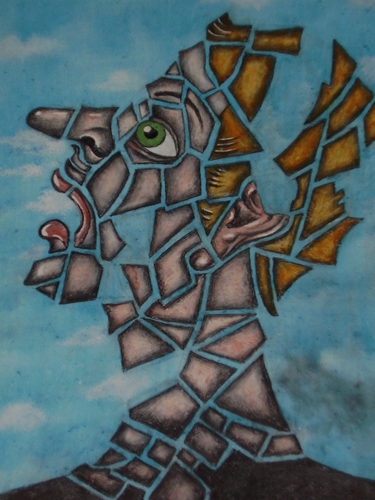 |
| Eric De Kolb, Nervous Breakdown |
On the
whole the word can be taken in this context to mean a failure of a defence or
organization. But immediately we ask: a defence against what? And this leads us
to the deeper meaning of the term, since we need to use the word “breakdown” to
describe the unthinkable state of affairs that underlies the defence
organization […]
In the more psychotic phenomena that we are examining it is a
breakdown of the establishment of the unit self that is indicated. The ego
organizes defences against breakdown of the ego-organisation and it is the ego
organization that is threatened.[…] in other words we are examining a reversal
of the individual’s maturational process.
[…] I
content that the clinical fear of breakdown is the fear of a breakdown that has
already been experienced. It is a fear of the original agony which caused the
defence organisation which the patient displays as an illness syndrome.
[…]There
are moments, according to my experience, when a patient needs to be told that
the breakdown, a fear of which destroys his or her life has already been. It is
a fact that is carried round hidden away in the unconscious[…] In this special
context the unconscious means that the ego integration is not able to encompass
something.
[…]It must
be asked here: why does the patient go on being worried by this that belongs to
the past? The answer must be that the original experience of primitive agony
cannot get into the past tense unless the ego can first gather it into its own
present time experience and into omnipotent control now assuming the auxiliary
ego-supporting function of the mother [analyst] In other words the patient must
go on looking for the past detail which is not yet experienced. This search
takes the form of a looking for this detail in the future.
[…] the
breakdown has already happened, near the beginning of the individual’s life.
The patient needs to “remember” this but it is not possible to remember
something that has not yet happened, and this thing of the past has not
happened yet because the patient was not there for it to happen to. The only
way to “remember” in this case is for the patient to experience this past thing
for the first time in the present, that is to say, in the transference. This
past and future thing then becomes a matter of the here and now, and becomes
experienced by the patient for the first time. This is the equivalent of
remembering, and this outcome is the equivalent of the lifting of repression that
occurs in the analysis of the psycho-neurotic patient.
Winnicott, D. W. (1974). Fear of breakdown. International Review of Psychoanalysis, 1, 103-107.
Winnicott, D. W. (1974). Fear of breakdown. International Review of Psychoanalysis, 1, 103-107.
Δεν υπάρχουν σχόλια:
Δημοσίευση σχολίου